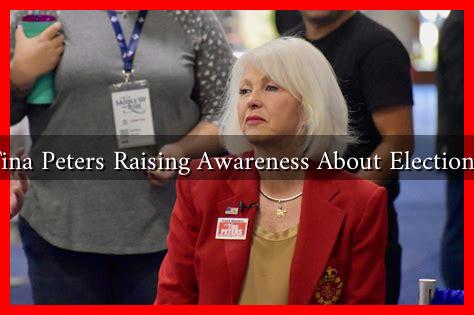-
Table of Contents
How Is Tina Peters Raising Awareness About Election Integrity
In recent years, the topic of election integrity has become a focal point in American politics, with various figures emerging to champion the cause. One such figure is Tina Peters, the former Mesa County Clerk and Recorder in Colorado. Peters has gained national attention for her controversial actions and outspoken views regarding the integrity of the electoral process. This article explores how Tina Peters is raising awareness about election integrity, the implications of her actions, and the broader context of this critical issue.
The Background of Tina Peters
Tina Peters first came into the spotlight during the 2020 presidential election, where she raised concerns about the security of voting machines in her county. Following the election, she became a prominent advocate for election integrity, claiming that there were significant vulnerabilities in the voting system that could lead to fraud.
. Her assertions have sparked both support and criticism, making her a polarizing figure in the ongoing debate over election security.
Key Actions Taken by Tina Peters
Peters has employed various strategies to raise awareness about her concerns regarding election integrity. Some of her notable actions include:
- Public Speaking Engagements: Peters has participated in numerous rallies and conferences, where she shares her views on election integrity. These events often attract large crowds and media attention, amplifying her message.
- Media Appearances: She has appeared on various news outlets and podcasts, discussing her allegations and advocating for reforms in the electoral process. Her appearances have helped her reach a wider audience.
- Legal Challenges: Peters has been involved in several legal battles concerning the security of voting machines and the transparency of the electoral process. These challenges have drawn attention to the legal frameworks governing elections.
- Social Media Campaigns: Utilizing platforms like Twitter and Facebook, Peters has engaged with supporters and disseminated information about her views on election integrity, creating a community of like-minded individuals.
Impact on Public Discourse
The actions of Tina Peters have significantly influenced public discourse surrounding election integrity. Her claims have resonated with a segment of the population that is increasingly skeptical of the electoral process. This has led to a few notable outcomes:
- Increased Scrutiny of Voting Systems: Peters’ allegations have prompted discussions about the security of voting machines and the need for transparency in the electoral process. Many states have begun reviewing their voting systems in light of her claims.
- Mobilization of Grassroots Movements: Peters has inspired grassroots movements advocating for election integrity, leading to increased participation in local and state elections. These movements often focus on demanding audits and transparency in the electoral process.
- Polarization of Opinions: While Peters has garnered support from some, her actions have also led to increased polarization. Critics argue that her claims undermine public trust in elections, while supporters view her as a whistleblower.
Case Studies and Statistics
To understand the broader implications of Peters’ actions, it is essential to consider some statistics and case studies related to election integrity:
- A 2021 survey by the Brennan Center for Justice found that 61% of Americans believe that election integrity is a significant issue, reflecting the growing concern over the electoral process.
- In 2020, several states conducted audits and recounts, with no evidence of widespread fraud found. However, Peters’ claims have led to renewed calls for similar audits in various jurisdictions.
Conclusion
Tina Peters has emerged as a significant figure in the conversation about election integrity, utilizing various platforms to raise awareness and advocate for change. While her actions have sparked both support and criticism, they have undeniably influenced public discourse and mobilized grassroots movements. As the debate over election integrity continues, Peters’ role serves as a reminder of the complexities surrounding this critical issue. The ongoing discussions about voting security, transparency, and public trust in elections will likely shape the future of American democracy.
For more information on election integrity and related topics, you can visit the Brennan Center for Justice.




